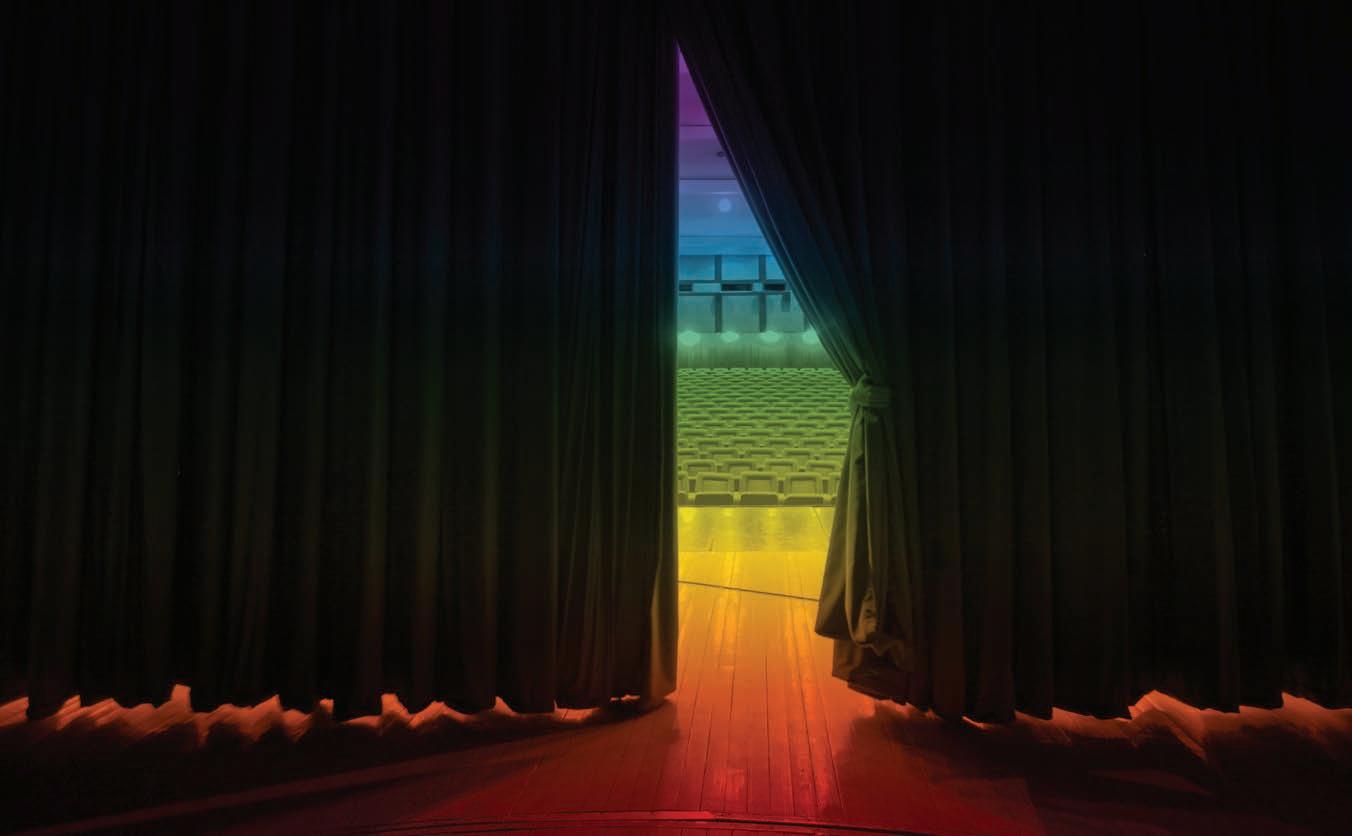
7 minute read
UPAF’s Patrick Rath on the Challenges Facing Wisconsin Arts Groups — MKE SPEAKS:
UPAF’s Patrick Rath on the Challenges Facing Wisconsin Arts Groups
BY DAVID LUHRSSSEN
Background and header image by nekotaro777/Getty Images.
When it was founded over half a century ago, the United Performing Arts Fund (UPAF) was focused on the Downtown building now called the Marcus Performing Arts Center. The scope has widened since then to the entire city. In recent years UPAF has allocated more than $8 million annually to its 14 member groups, much of it for Milwaukee Symphony Orchestra, Milwaukee Repertory Theater, Milwaukee Ballet, First Stage, Florentine Opera Company and Skylight Music Theatre. UPAF receives no government funding and depends on contributions from individuals, companies and foundations. Greendale-born Patrick Rath was named president and CEO of UPAF in October 2020, bringing hands-on experience in performance as well as philanthropy to the position.
Were the arts part of your background?
I was fortunate to be involved in arts at a young age as I took to the string bass—mainly because I did not need to carry it to school. By age 10, I started playing in the Music for Youth program which is now known as Milwaukee Youth Symphony Orchestra—a founding UPAF Member. Learning an instrument opened up many possibilities for me including lifelong friends, important skills such as collaboration, listening and appreciation of different backgrounds. I was also able to receive a scholarship to attend Northwestern University as a music performance major—having a chance to attend a notable university would not have been possible if I did not have the background and training in the arts.
How did your previous work prepare you for your role at UPAF?
I have been fortunate to work for pillar non-profit institutions in our community. The Milwaukee Public Museum, Milwaukee

Art Museum and the Milwaukee Symphony Orchestra are all institutions that I have advanced as a development professional. However, it was never me alone. I learned early on the value and importance of volunteers for non-profit organizations. Milwaukee is a wonderful town where people are ready to say “yes” to be of assistance—it may be to assist in the office or to make a call that secures a donation. There is not a single non-profit that can function without active involvement of its volunteers.
I am very appreciative of this, and it is the reason why we initiated UPAF’s Chorus Line this year to create a growing and enthusiastic group of volunteers who wish to share their appreciation for the performing arts and encourage greater support. The Chorus Line is a major effort for us over the next three years to significantly grow this pool of active volunteers.

How does a performing arts group qualify for UPAF membership?
UPAF Membership has been through an invitation process for the last many years. UPAF originally started with six members who were all tenants of the newly created Performing Arts Center. Over time, our membership has grown as new and emerging arts organizations gained greater community support. Thanks to UPAF, there is an incredibly diverse and vibrant performing arts sector that is engaging well over 700,000 people annually. We also know that beyond our membership there are many more valued arts organizations in our region. UPAF supports these organizations through our Affiliate grant program which last year provided operating funds to 26 regional organizations that add so much to the arts landscape.
Even more important, having this broad cultural eco-system ensures that artists can live in Milwaukee and earn a living as an artist. We have nearly 1,200 artists who reside in southeastern Wisconsin and are able to be full-time creative professionals because there are so many opportunities for work. This is not true in most other cities in the country.
You came into UPAF during a time of unusual uncertainty caused by COVID. How did UPAF adjust to the pandemic? Did the organization take any special steps to assist its Member groups during this difficult time?
The closures of theater venues due to the pandemic had an immense and significant impact on the near and long-term outlook of the performing arts. Overall, $38 million in revenue was lost by UPAF Members from the start of the pandemic through this season. This is revenue that is simply lost as it was predominantly unsold tickets because the arts could not open their doors to the public. There was one-time federal support which did help the arts in Milwaukee and across the country. This was helpful to all organizations last year as it made up nearly 25% of their operating revenue. However, this revenue does not exist for the upcoming 2022-23 season and most UPAF Members are facing significant deficit situations.
UPAF has drawn as much from its relatively small reserves to help during this timeframe. In total, UPAF has invested an additional $1 million for its Members beyond our annually raised funds. We have also been challenged in raising funds as we experienced a drop of $1.5 million of lost revenue as employees were not in the workplace or shifting careers. We have been working to recover this funding but it will take several more years to grow and return to levels that we saw pre-pandemic. However, the need for the performing arts sector has never been greater and we welcome everyone to support the performing arts with a gift—which is easy to do at upaf.org or to your favorite local performing arts group.
How successful was this year’s Ride for the Arts?
Very successful. We were one of the few events during the pandemic to maintain a presence as we worked with the city and county to create safe environments for participants and volunteers. UPAF received more than $450,000 in total support which was $70,000 more than in the previous years. We are appreciative that great sponsors continue to value this event such as Miller Lite. We also were able to bring back great performances by UPAF Members and Affiliates with more than 20 different acts that day throughout the entire course. With 2,700 riders that day, there was something for everyone from the closed “Hoan Loop” course (the only event to offer this experience) to the arts path, which was accessible to all, we are always intent to make this an enjoyable experience for all regardless of your experience riding a bike. With the continuation of our sponsorship support, we intend to host the Ride for the Arts on June 4, 2023.
Do you see UPAF changing in the near future, such as adding new member groups or defining its role differently?
UPAF is at a point of change both due to the pandemic as well as changes in donor engagement. The performing arts we have today is due to thousands of donors who annually support what we have. However, for the first time in a generation, we may not have the performing arts sector as we have known. There is a significant challenge to each UPAF Member and Affiliate due to the significant lack of public support in our community.
Wisconsin ranks 49 out of 50 states in terms of public arts funding. UPAF Members have combined budgets of nearly $60 million yet there is less than $700,000 in local public funding for all of the arts. The arts cannot continue to be supported by private support alone. We need to fix our broken funding model to be a healthy mix of public, annual and long-term funding. UPAF Members are continuing to work together to define the issues we continue to face and will offer solutions that can ensure a healthy arts sector for generations to come. It will take significant support, but the benefits for our youth development, business growth, and downtown housing are all directly impacted by the health of the performing arts and has been this way for the last 50 years.
For UPAF’s part, we will be actively growing our total donor base by engaging more individuals and companies to support and enjoy the performing arts. UPAF is known for its stewardship of funds received and we never take this for granted as all that we have is due to the generosity of the community. As such, we will look to grow our support for our Affiliate program as our Membership support returns to past expectations—all in an effort to continue to retain and attract incredible professional artists from all backgrounds that choose Milwaukee to be their creative home.
David Luhrssen is Managing Editor of the Shepherd Express and was cofounder with Louis Fortis of the Milwaukee International Film Festival.










